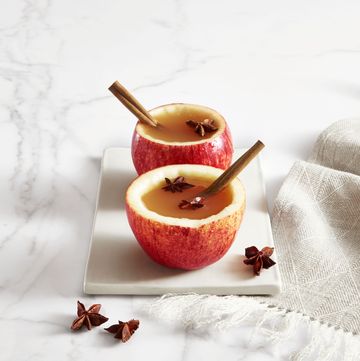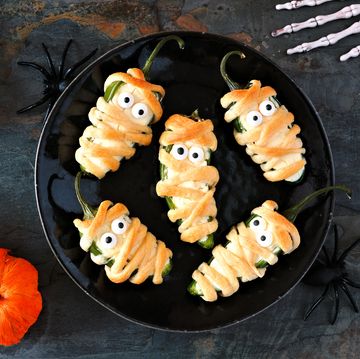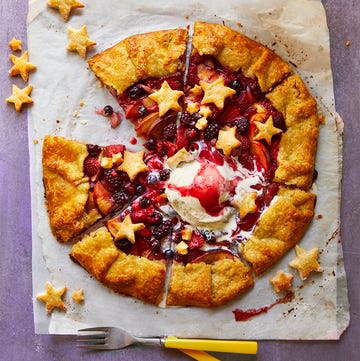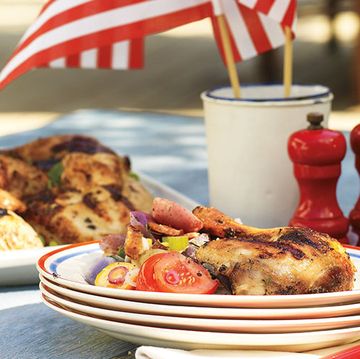Rosh Hashanah is a celebration of the Jewish New Year that occurs in late summer or early fall. It translates to "head" or "first of the year." And this year it falls on Friday, September 15, and ends on Sunday, September 17.
To celebrate the start of a brand new year, many foods you'll find on Jewish tables at this time are extra sweet—literally and symbolically—to represent sweetness and a bountiful blessing to start the year. We chatted with cookbook authors Rachel Levin (Eat Something), Jake Cohen (Jew-ish), and Leah Koenig (The Jewish Cookbook) to hear how they celebrate Rosh Hashanah and what the foods symbolize.
The foods that Jews eat during Rosh Hashanah can differ from family to family. "The beautiful thing about Judaism is that the Diaspora touches every corner of the world, taking our rituals and adapting them to the local food cultures," Cohen said. "The result is a shared thread throughout Jews across the globe that we all sweeten our New Year, but what we sweeten it with will vary."
More From Woman's Day

Koenig loves that Ashkenazi Jews, who originally hail from Eastern and Central Europe, can prepare a table in a way that's totally different than a Jewish family who come from Morocco, Calcutta, Turkey, or Uzbekistan. "That's what I appreciate so much about Jewish cuisine—it's a way to experience the world while keeping true to the shared roots and traditions of the holiday," she said.
"The Jewish New Year is for sure my favorite new year—not just because I’m Jewish, although that’s part of it, obviously," Levin said. "It’s low-key festive, in a cozy, fall kind of way."
Looking for some more Rosh Hashanah inspiration? We have over 50 recipes to help you celebrate the New Year.
Apples and Honey
"Jews have been dipping apples in honey for thousands of years to ensure a sweet, fruitful year ahead," Levin said. "Shana tovah um’tukah, you say—good, sweet year—or shana tovah for short."
Dates
The Hebrew word for dates, t'marim, means "to end" or "to finish off." So it's fitting that sweet dates are enjoyed at the end of one year and the beginning of another.
Pomegranate
"[Pomegranates are] said to have 613 seeds, each representing a mitzvot from the torah," Cohen said.
Ash-e-Reshteh
"Persian Jews, like my in-laws, will often serve Ash-e-Reshteh, a noodle and bean soup, with the symbolism of long noodles for longevity," Cohen said.
Challah
"In my family, challah is paramount on Rosh Hashanah," Koenig said. "I love how, unlike the rest of the year when the challah is braided, Rosh Hashanah challah is round or spiraled to represent one's hopes for continuity in the year ahead." She also loves that it will often have raisins or be dipped in honey, "both to express wishes for a sweet New Year."
Honey Cake
Many families have their own recipes for honey cake, but just like everything else on this list, they are sweet and intended to celebrate the sweetness of the new year.
Fish
"I don’t do the fish head thing," Levin said, referring to the tradition of having a head of fish or meat on the table to represent the head or beginning of the year. "Sure, it’s the Head of the Year and all, but I prefer the nice pink flesh of, say, a perfectly open-poached salmon."
But many Jewish tables will have a head of some sort, ranging from a sheep to a rooster to a whole fish.
Chicken
It isn't Rosh Hashanah for Koenig without some kind of roast chicken, and her go-to is her own recipe, Fig Glazed Chicken with Apples. "The sticky-sweet glaze is perfect for Rosh Hashanah, which is all about sweetness," she said. "I really love to highlight the abundance of the late summer/early fall season too, so we usually make lots of roasted vegetables and green salads topped with pomegranate seeds."




















